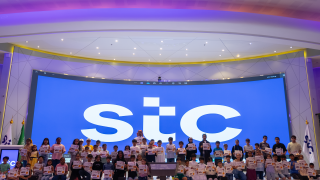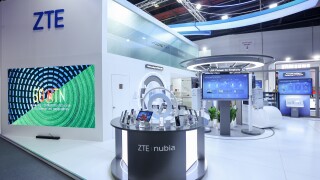|
|
International Telecommunications Week’s second year in Chicago proved an enormous success as 5,792 delegates returned to the event’s new home at the Hyatt Regency.
Representatives from 1,846 companies across 146 countries descended upon the city, exceeding last year’s figures and consuming a record amount of coffee in the process – over 20,000 cups according to the Hyatt Regency.
This year’s event significantly raised the stakes with an opening plenary from US Vice President Al Gore.
Over half of the expected delegates had already checked in by Sunday evening when Al Gore opened the event, heralding the growth in technology as a major driver towards global change.
|
| Al Gore, US Vice President |
Al Gore served as the 45th Vice Present of the US under President Bill Clinton between 1993 and 2001, and at the opening keynote panel, he highlighted the challenges carriers face due to the democratisation of technology, and how disruptive technologies could further impact traditional telecoms service providers in the future.
“The wholesale market is not only an industry, but it is also a community,” Al Gore said during the opening address for ITW 2013.
“There are so many different interests and everyone is facing a common set of challenges. The size of this market is rapidly growing and innovation lies in the heart of your industry. There is an intrinsic value of the internet which continues to grow as more people are connected to it.”
Down on the exhibit floor, representatives from 45 carriers were on show, with Vodafone in particular taking advantage of ITW’s global platform to officially launch its carrier services business at the event. Named Vodafone Carrier Services, the move follows the company’s acquisition of Cable&Wireless Worldwide, completed last year.
Throughout the fast-paced three day event, many more partnerships were made, further deals were signed, old relationships were reignited and new relationships were formed, in what many claimed to be the best ITW yet.
What you might have missed at ITW 2013:
Some of the biggest stories and topics to come out of this year’s event, as exclusively reported by the Capacity magazine editorial team:
Day 1
On day one of ITW 2013, Capacity exclusively revealed the results of its C100 survey. Interviewing C-level executives across the wholesale telecommunications arena, the C100 looked to identify the issues and concerns weighing most heavily on the minds of industry executives.
The results were delivered in a panel discussion attended by over 300 delegates and presented by motivational speaker Mike Lipkin, with comment from panel members Michel Guyot, president of global voice solutions at Tata Communications, Willem Offerhaus, CEO at iBasis, and Alexandre Pébereau, EVP of international carrier services at Orange.
Innovation emerged as a key area of interest for wholesale telecommunications, with many carriers deeming it essential for revenue growth. IPX was seen as a major area for innovation with 63% of respondents identifying it as the dominant area for growth. Overall, the survey highlighted a strong feeling of optimism in the market, with 56.5% and 20.3% stating they were “confident” or “very confident”, respectively in the future of wholesale.
“This report puts the spotlight on the thoughtfulness and vision of the leaders within our industry,” Guyot said.
“We will need both to successfully navigate the transformation and innovation the coming years will bring.”
Other exclusive news surfacing from day one included Hibernia Networks announcing that TE Subcom will be its new partner for the Project Express Cable.
Earlier this year, the company was reported to have halted work with previous partner Huawei following concerns from several North American firms over its cyber security. Bjarni Thorvardarson, CEO of Hibernia Networks, said that this resulted in the company switching vendors halfway through the project.
“It was a very unfortunate thing that cost us a substantial amount, and this has much to do with issues with Huawei,” he said.
Work on the Project Express cable began in 2010 which endeavours to connect London, UK, to Halifax, US. Thorvardarson stressed that the switchover of vendors does not represent a halt in the cable’s progress, and he is still looking towards a completion date at the end of 2014.
On the same thread of collaboration, Sprint also announced its partnership with data centre provider Interxion for the management of a PoP in Madrid on the first day of the event.
The partnership is expected to enhance Sprint’s presence in the city and the company will use Interxion’s Madrid data centre to expand its international Ethernet services for US nationals working and living in Spain.
Interxion has 33 data centres in 11 European cities, and Robert Assink, managing director at the company said: “Sprint’s commitment to grow with Interxion demonstrates the strong returns our data centre facilities continue to provide.”
Day 2
A landmark agreement between the GSMA and i3forum made the headlines on day two. The move will see the pair accelerate the take-up of IPX, based on interconnection agreements through live commercial pilots from voice traffic.
Global operators including Deutsche Telekom, Orange, Telecom Italia, Telefónica, TeliaSonera and Vodafone have all conducted pilots for voice over IPX this year.
Representatives from a range of operators sat on a panel session on day 2 to discuss the merits of the agreement at which Philippe Millet, chairman of the i3forum, said: “By partnering with the GSMA, we can share knowledge with the mobile industry to quickly deploy IPX interconnects to scale, delivering enhanced quality and reliability for existing and new IP communication services.”
IPX continued to be a key topic of discussion on day two of the event as AMS-IX and Hutchison Global Communications (HGC) also announced an IPX partnership agreement.The move will see AMS-IX launch its inter-IPX service in Hong Kong, via HGC’s peering platform, and is expected to enable IPX providers, and other mobile operators, further access to securely peer IP traffic at a local level.
AMS-IX claimed it was the first global exchange to introduce such a service and hopes the development will eventually blur the division between mobile and fixed-line networking.
“As mobile traffic is growing fast around the globe and the number of 4G deployments grows, an inter-IPX service at AMS-IX Hong Kong is valuable to its customers,” said Job Witteman, CEO at AMS-IX.
AMS-IX launched a similar service in the Caribbean last year, which follows on from its successful introduction of IPX services in Amsterdam in June 2011.
At the other end of the service spectrum, Level 3 took the limelight on day two as it announced the launch of its Carrier Cloud Voice Solution.
Introduced in a bid to help operators to expand voice services, Level 3 has partnered with cloud-based voice provider Alianza for the service, which is said to provide an outsourced voice solution to operators, wireless carriers and MSOs in the market.
Level 3 will combine its enhanced local services with Alianza’s cloud-based voice platform to also provide solutions for back office integration, such as billing and service management.
The solution looks to set a trend in next-generation voice evolution, and Shaun Andrews, SVP of global voice services at Level 3, said: “With several key customers already purchasing our joint solution, we know this value proposition resonates in the marketplace.”
Day 3
The third and final day of the event showed no signs of slowing down as companies made the most of their last networking opportunities.
TeliaSonera reached an agreement with Edgecast Networks for the CDN provider to help expand its CDN offering and expand its customer base. The deal is expected to allow EdgeCast to also increase its network reach and capacity, as well as improving overall performance for both companies as they place a heavier focus on, and invest significantly in, network infrastructure and development.
The demand for CDN solutions across TeliaSonera’s Nordic market has notably increased, and the company hopes the agreement will address this.
“The partnership with CDN company EdgeCast positions us perfectly to offer a global suite of CDN solutions to the Nordic customer base while also adding a significant new source of revenue,” said Staffan Göjeryd, VP of product management at TeliaSonera.
Also on day three was an announcement by Etisalat that Limelight Networks has become the newest member of its Smarthub platform.
Limelight hopes that by joining Smarthub, it will benefit from the ability to provide faster and higher quality internet services to its customers.
“We are pleased that our wide delivery network can continue to deliver more enhanced digital experience across the web, mobile devices, social and large screen channels,” said Nathan Raciborski, founder and board member of Limelight Networks.
Acquisitions were also on the agenda at this year’s ITW with Dublin-based Digiweb Group signing deals for both Viatel and VTLWaveNet at the event.
Digiweb hopes the acquisitions will enable the creation of a pan-European telecoms provider, with operations extending to the UK, Ireland, France, Germany, the Netherlands, Belgium, Switzerland and Italy.
“We see a strong opportunity for cross border consolidation in the telecoms sector in Europe in parallel with the explosion in high bandwidth connectivity demand,” said Colm Piercy, group CEO at Digiweb.
Viatel had invested $1.5 billion in the construction of its low-latency carrier fibre network, connecting 21 cities across 8600km of network in Western Europe, and investors in the company are said to be putting equity into Digiweb.




